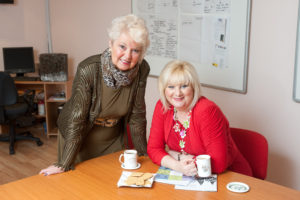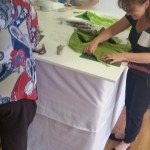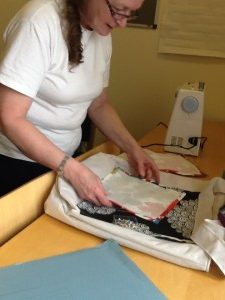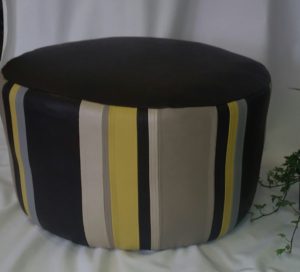The Sewing Rooms, a social enterprise based in Lancashire in the north of England, is running a programme of community sewing projects specifically for isolated and vulnerable women over the age of 50. Registered as a community interest company, The Sewing Rooms has developed a social model of change based on meaningful routes to training and employment through personal development, both emotional and professional.
Having worked for more than 10 years with various communities on strengthening wellbeing through improved mental health, The Sewing Rooms team has seen firsthand many of the factors that affect loneliness and self-confidence. From low levels of income and educational attainment to poor physical and mental health and living in isolated rural or deprived urban communities, the factors that affect individual wellbeing are complex and inter-related. No single symptom can be treated in isolation.
Working within the structure of the five ways to wellbeing1 – Connect; Be Active; Take Notice; Keep Learning; and Give – The Sewing Rooms’ projects help individuals build their skillsets and knowledge, and thus confidence, in being equipped to deal with life’s difficulties. The Sewing Rooms measures the results and effects of its projects through the Warwick-Edinburgh Mental Wellbeing Scale (WEMWBS)2.
The social enterprises focuses on building the self-confidence of participants and looks for creative connections to match each individual with appropriate employment or volunteer opportunities. Whenever possible, the organization also hires trainees and recommends them for additional job opportunities.
As Paula Gamester and Maureen Fazal, co-founders and directors of The Sewing Rooms, say:
“We believe everyone should be able to take advantage of the opportunities around them so that they can determine their own destiny.”
And now with its most recent launch of Patchwork Buddies (funded through Awards for All), The Sewing Rooms is focusing on an oft-overlooked and thus particularly vulnerable group of people – isolated, ageing women. Loneliness is a growing problem faced by the UK’s health and social services, with research increasingly linking loneliness with ill health. For many women, the experience of a breakdown of a marriage or a bereavement can leave them feeling alone, isolated and unsure who or where to turn to for support.
Additionally, many women give up meaningful employment to take on caring responsibilities, sometimes for multiple generations at once. When circumstances change, it can be difficult to rekindle former interests and activities. The Sewing Rooms recognises that, unfortunately, most of that care work remains unappreciated, economically and socially. Further compounding the lack of resources available to women in these situations is the scarcity of gender and age-specific social services and support networks.
Working closely with a number of local care organisations, including a domestic violence shelter, primary mental health care teams and probation offices, Patchwork Buddies is reaching a variety of women with diverse experiences. The project was developed in consultation with community members and has been widely advertised, encouraging individuals to get in touch to register their interest as well as reaching others through referral.
The premise of Patchwork Buddies is that through the process of learning, sharing and working together, the women taking part support each other in creating positive lifestyle changes. Practical creative skills that are taught include using a sewing machine, measuring and cutting fabric, planning and problem solving and working together as a team. The lessons build from basic stitches to more complex designs and skilled approaches. The Sewing Rooms provides dedicated space to Patchwork Buddies participants, helping to encourage confidence and a sense of belonging.
One of the five ways to wellbeing is “Give”, and Patchwork Buddies actively encourages participants to find opportunities for this practice. Soft furnishings, bags and clothing created by workshop members from upcycled, donated materials have been given free of charge to community projects that help others in need. Patchwork sewing skills are in particular demand for community art pieces, and The Sewing Room’s team pitches for commissions that Patchwork Buddies groups fulfill.
Side-by-side with the practical creative skills, Patchwork Buddies sessions teach emotional resilience. This aspect of the programme explicitly discusses the Five Ways to Wellbeing and focuses on improving participants’ ability to recognise the signs and symptoms of anxiety and depression. This then leads to earlier, more effective responses and self-care and management. Participants also take part in inspirational group activities that range from visits to local green spaces to submitting work to art and craft exhibitions. Each participant compiles a personal record of their development that includes goals, reflections and lessons learned. The Sewing Rooms team works with participants in a range of settings, mixing one-to-one discussions with group sessions and of course, learning to sew.
Three of The Sewing Rooms current employees are former trainees and workshop participants. Shortly after completing her first course in The Sewing Rooms, one shared:
“During my time here, my mood and self-esteem have noticeably improved. I’ve started to enjoy learning again instead of feeling the crippling fear and anxiety that I used to feel when faced with new situations. For the first time, I feel able to manage my illness.”
One of her recent products was auctioned as one of the prizes at the UK’s only national re-use conference, and the lucky winner said: “Stylish design, great craftsmanship, true resource efficiency and most of all – a story of a human life being restored. It’s all there in the wonderful pouffe I purchased at auction at the Furniture Re-use conference. Well done to [the entire team]. You are making a world of difference – one item at a time!”
Patchwork Buddies is under additional scrutiny from the local health service because the programme is being used as a pilot for a future social prescribing route for regional GPs. Quantitative and qualitative assessments are part of The Sewing Rooms’ measurement practices, and results are published in annual social impact reports.
The Sewing Rooms team is eager to exchange knowledge and learn from other organisations and requests that readers get in touch with ideas, comments and suggestions.
1 http://www.neweconomics.org/projects/entry/five-ways-to-well-being
2 http://www.healthscotland.com/documents/1467.aspx
Keely Khoury is a freelance writer and editor based in the UK




